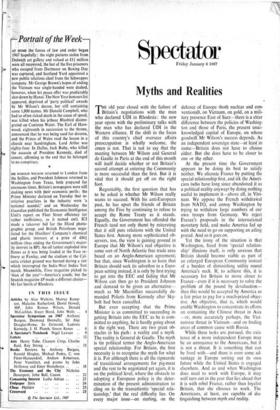Myths and Realities
THE old year closed with the failure of Britain's negotiations with the man who declared UDI in Rhodesia : the new year opens with the preliminary talks with the man who has declared UDI in the Western alliance. If the shift in the focus of this country's chief overseas affairs preoccupation is wholly welcome, the omen is not. That is not to say that the meeting between Mr Wilson and General de Gaulle in Paris at the end of this month will itself decide whether or not Britain's second attempt at entering the Community is more successful than the first. But it is vital that it should get off on the right foot.
Regrettably, the first question that has to be asked is whether Mr Wilson really wants to succeed. With his anti-European past, he has upset the friends of Britain among the Five by continuing to refuse to accept the Rome Treaty as it stands. Equally, the Government has offended the French (and not only them) by reiterating that it still puts relations with the United States first. Among more sophisticated ob- servers, too, the view is gaining ground in Europe that Mr Wilson's real objective is some sort of North Atlantic free trade area based on an Anglo-American agreement; but that, since Washington is so keen that Britain should seek its salvation in a Euro- pean setting instead, it is only by first trying to get into the EEC and failing that Mr Wilson can then go to President Johnson and demand to be given an alternative— much as Mr Macmillan successfully de- manded Polaris from Kennedy after Sky- bolt had been cancelled.
But even accepting that the Prime Minister is as committed to succeeding in getting Britain into the EEC as he is com- mitted to anything, he is hardly going about it the right way. There are two great ob- stacles in his path : a reality and a myth. The reality is General de Gaulle. The myth is (in political terms) the Anglo-American special relationship. For Britain, the first necessity is to recognise the myth for what it is. For although there is all the rigmarole of transitional arrangements for pig-meat and the rest to be negotiated yet again, it is on the political level, where the obstacle to adopting a European policy is the deter- mination of the present administration to cling on to the transatlantic- 'special rela- tionship,' that the real difficulty lies. On every major issue—on sterling, on the defence of Europe (both nuclear and con- ventional), on Vietnam, on gold, on a mili- tary presence East of Suez—there is a clear difference between the policies of Washing- ton and those of Paris, the present unac- knowledged capital of Europe, on whOse goodwill Mr Wilson's success depends. As an independent sovereign state—at least- in name—Britain does not have to choose either. But she does have to be closer to one or the other.
At the present time the Government appears to be doing its best to satisfy neither. We alienate France by putting the special relationship first, and irk the Ameri- cans (who haVe long since abandoned it as a political reality anyway) by doing nothing useful to implement it—above all, in Viet- nam. We oppose the French withdraifal from NATO, and annoy Washington by trying to withdraw large numbers of our own troops from Germany. We reject France's proposals in the international monetary field, and make America fed up with the need to go on supporting an Ailing pound. And so it goes on.
Yet the irony of the situation is that Washington, freed from 'special relation- ship' illusions itself, is only anxious ' that Britain should become viable as part of an enlarged European Community instead of a burden of diminishing utility round. America's neck. If, to achieve this, it is necessary for Britain to move closer -to France—even if it is necessary to solve the problem of the pound by devaluation.— then this would be accepted by America as a fair price to pay for a much-prized objec- tive. An objective, that is, which would enable Washington to concentrate its efforts on containing the Chinese threat in Asia —or, more accurately perhaps, the Viet- namese threat in Vietnam—and on finding areas of common cause with Russia.
While these tasks are pursued, the exis- tence of a more independent Europe may be an annoyance to the Americans, but it is not a threat. It is something that can be lived with—and there is even some ad- vantage in Europe sorting out its own future while the United States is engaged elsewhere. And as and when Washington does need to work with Europe, it may well turn out in the year that lies ahead that it is with rebel France, rather than loyalist Britain, that she chooses to work. The Americans, at least, are capable of dis- tinguishing between myth and reality.






























 Previous page
Previous page